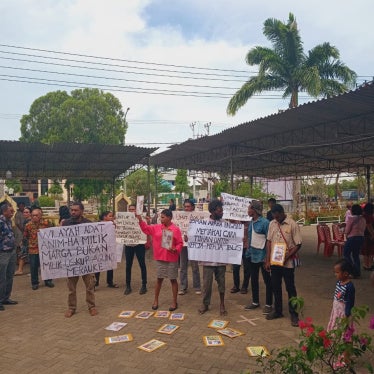We are writing to express our deepest concern about the case of Sergei Duvanov, a journalist who on January 28 was convicted of rape by the Karasai District Court. We believe that Mr. Duvanov was denied his right to due process during the police investigation and his right to a fair trial. These concerns, as well as the circumstances surrounding the case, strongly suggest that the case against him was politically motivated and that his conviction represents a miscarriage of justice. We ask that you ensure an impartial review of the charges against him, and that he be released prior to such a review.
On October 28, 2002, Karaisi district police arrested Duvanov and accused him of forcibly raping a minor the previous day. On January 28, the Karasai District Court convicted him on these charges and sentenced him to three and half years of imprisonment. Duvanov has maintained his innocence.
Human Rights Watch cannot comment on Duvanov’s guilt or innocence, but we believe that he was denied his basic rights to due process and a fair trial. Available information indicates that he was not afforded the opportunity to present an adequate defense, and that the trial court was not impartial in its proceedings.
The principle of “equality of arms” is enshrined in international standards and Kazakh law, as an essential element of the right to adequate facilities to prepare a criminal defense. Article 14 of the International Covenant on Civil and Political Rights states that “everyone shall be entitled to the following minimum guarantees in full equality: to have adequate time and facilities for the preparation of his defense . . .” But prior to trial, in the crucial area of forensic testing, Duvanov was denied this right. Neither Duvanov nor defense counsel were given copies of the orders for six sets of forensic testing. Hence, neither Duvanov nor defense counsel could exercise the right under article 244 (2-3) of the Kazakh criminal procedure code to petition for the appointment of experts or challenge the appointment of the prosecution’s experts.
In several important respects the court demonstrated a lack of impartiality, which violates Duvanov’s right under article 14 of the ICCPR to a “fair and public hearing by a competent, independent and impartial tribunal.” The court declined to hold pretrial hearings at which defense counsel could have brought allegations of serious due process violations committed during the investigation. In declining counsel’s request for such hearings the court reasoned that no violations had taken place. The court refused to allow Duvanov to meet in private with defense counsel during the first week of the trial.
The court’s failure to respect the principle of equality of arms further eroded its impartiality: it refused without explanation to admit as evidence numerous items that defense counsel believes to have been exculpatory. In one example, the court declined defense counsel’s petition to review or admit as evidence important information about the circumstances placing the victim and her family in Kainar—the village where Duvanov’s summer cottage is located—one month before the alleged offense took place. Neither the police nor the court probed court testimony that a police officer paid a local resident to lodge the victim and her mother because they were “important witnesses in a case.”
The court also declined a petition by defense counsel to have an expert witness examine the lock on the kitchen door at Duvanov’s summer cottage, which was vital to the account given by the victim.
The court admitted as evidence testimony by three important prosecution witnesses who failed to appear for court hearings. It is unclear why the court found it acceptable to accept their testimony without giving defense counsel the opportunity to cross-examine them. It also admitted as evidence testimony by a neighbor who claimed that he understood by an ambiguous physical gesture—the nodding of his head in response to the neighbor’s nod—that Duvanov was acknowledging his guilt.
The circumstances surrounding Duvanov’s arrest suggest political involvement that may in turn have unduly influenced the court. Duvanov has been a long-time critic of government policies and official corruption. He had been scheduled to travel to the United States on October 29 to be honored by the International League for Human Rights, and to speak at numerous forums about government corruption and the poor state of civil liberties in Kazakhstan. This is not the first time Duvanov has been the apparent target of politically motivated criminal prosecution. In July, prosecutors brought charges against Duvanov for his Internet postings about government attempts to silence journalists covering Swiss and U.S. investigations into alleged corruption. On August 30, he was viciously attacked by unknown assailants, who inflicted a head injury and knife wounds. These events occurred in a context of the growing incursions on media freedoms in Kazakhstan, a trend confirmed by the Organization for Security and Cooperation in Europe.
We urge your government to undertake an impartial review of the case against Sergei Duvanov and take appropriate action.
Thank you for your attention to these concerns.
Sincerely,
Elizabeth Andersen
Executive Director
Europe and Central Asia division







